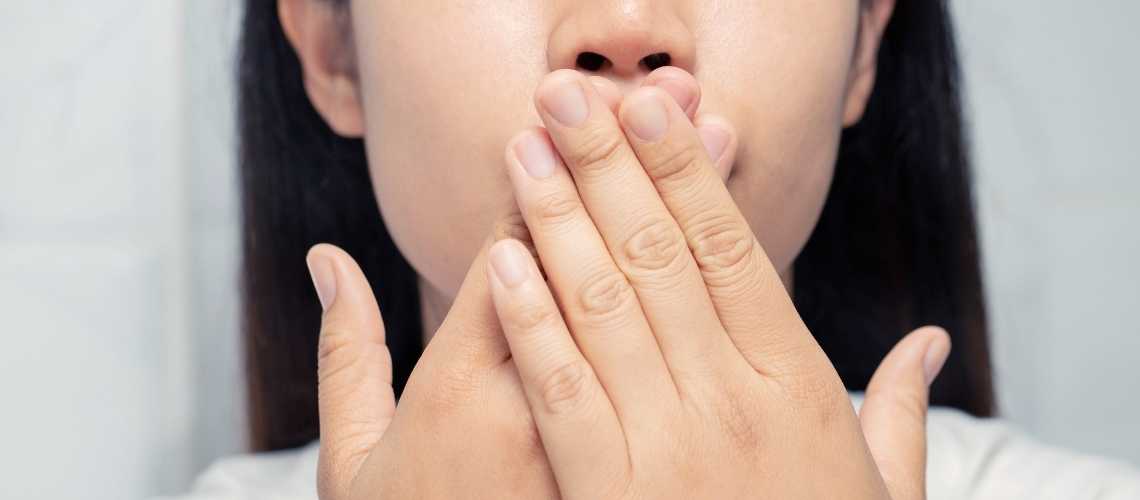
Why Does My Breath Smell After Bariatric Surgery? Bad breath is another common concern following weight loss surgery. Dehydration, food that doesn’t empty your pouch properly, or weight loss can all cause bad breath.
Bad breath, like other common side effects of weight loss surgery, can be prevented or alleviated by drinking plenty of water. Women should drink at least 48 ounces of water per day, while men should drink at least 64 ounces. Regardless of whether you have bad breath or not, you should do this.
Another cause of bad breath after weight loss surgery is that the food, you’re eating is not emptying quickly enough from the smaller stomach pouch. Bad breath can be caused by the accumulation of stomach acids in the pouch. In these cases, taking with the over antacid may be beneficial.
What Can you Do?
One of the rare side effects of bariatric surgery is bad breath. When a person talks, yawns, belches, or breathes through their mouth, an unpleasant odor emanates from their mouth.
Despite the fact that it is not a serious health problem, its adverse effects on self-esteem and wellbeing makes it a source of major worry for the person who is affected. The good news is that it is only temporary and can be suppressed.
In the United States, gastric sleeve surgery is the most effective and widely used bariatric (weight loss) surgery. It is a restrictive surgery in which the stomach’s capacity is reduced and ghrelin production is reduced (an appetite-stimulating hormone). Weight loss and betterment in comorbid conditions follow, as does a decrease in appetite and calorie intake.
While weight loss does not always result in bad breath, it can cause a change in the odor of your breath. Ketones are by products that form as your body breaks down stored fat as you lose weight.
Ketones are partially exhaled, resulting in a condition known as ketotic breath. While some people find ketotic breath distressing, others describe it as a lovely odor similar to Juicy Fruit gum.
Although some experts recommend adding a few carbs to your diet to combat ketotic breath, adding further protein to your diet may minimize the effects of diabetic ketoacidosis breath without interrupting with your weight loss.
After Weight Loss Surgery
Number of calories is reduced after liposuction (gastric sleeve included), as is the amount of energy-giving foods the body receives from a daily meal. The body is expected to generate the energy deficit from stored fat through a process known as fatty acid synthesis.
This is the last step in the bariatric surgery process. This method of fats breakdown is followed by ketogenesis, which involves the formation of ketone bodies, which serve as energy sources for various organs.
Ketones can form after any massive weight loss, but they’re more noticeable after weight loss surgery due to the rapid mobilization of stored fat.
How to Manage Bad Breath After Weight Loss Surgery?
- Make sure to stay hydrated.
- After every meal, liquid or solid, brush and floss. Brush your tongue with caution, as bacteria and foreign substances can accumulate on the surface.
- Chew sugar free gum to increase the production of saliva that fights doors.
- Cinnamon flavoured gums are a good option. According to some studies, a component of cinnamon gum may decrease the quantity of bacteria in your mouth.
- To remove food particles more thoroughly, use a water pick.
- Make an appointment with a dentist to rule out dental problems or tooth decay as the source of your bad breath.
- Prolonged bad breath is sometimes a sign of this other underlying health issue, such as infection, kidney damage, or liver failure, in rare cases. If drinking more water each day and practicing good oral hygiene are not enough to cure your bad breath, see your doctor.
Is It Normal to Have Bad Breath After Surgery?
If you’re planning to undergo a dental procedure, you’re probably wondering, “Is it normal to have bad breath after surgery?” If so, this article will give you some insight into the possible causes of “bad breath” after oral surgery.
First of all, it’s important to remember that “bad breath” after oral surgery is not a symptom of any serious condition. However, it can be a sign of an infection or another problem with your mouth.
The common cause of this condition is acid reflux, a backward flow of stomach contents into the esophagus. It can cause bad breath after surgery, but the good news is that it’s usually temporary. Moreover, the condition can damage teeth and gums.
Generally speaking, mouth odor after surgery is a normal part of the healing process or an indication of something more serious.
Although mouthwash can help to remove bacteria, most dentists advise against using it for the first 24 hours after an extraction. Additionally, it can lead to dryness, which increases the chances of bad breath after extraction.
Excessive rinsing can also cause dry mouth, as saliva is the best defense against bacteria and cleans away odor-causing chemicals. In any case, it’s important to follow the post-op instructions carefully to avoid these problems.
As mentioned, some medical conditions can cause chronic or persistent bad breath, so it’s important to visit a dentist to get a professional opinion.
While you can always buy mints and use good oral hygiene, bad breath can be a sign of a more serious problem. It’s always wise to see your dentist for an assessment of your condition to ensure that your mouth is healthy enough to heal without any further problems.
How long does bad taste in your mouth last after surgery?
There are certain people who frequently suffer an unpleasant taste in their mouth after surgery. This taste’s duration can change depending on a number of variables.
In general, there are a number of causes for the foul taste in the tongue following surgery. A lasting aftertaste may result from anesthesia, medicines, and equipment use after surgery. The altered taste may also be a result of the body’s normal response to inflammation and healing processes.
Following surgery, the duration of the foul taste usually goes away between a few days to a few weeks. It is crucial to remember that everyone’s experiences will be different. The length of the foul taste can vary depending on the type and complexity of the surgery, the body’s healing process, and the person’s general health.
It is advised to speak with a healthcare provider if the terrible taste lasts for a long time or is accompanied by other unsettling symptoms. They can assess the circumstance and offer the necessary advice or care to resolve the problem.




